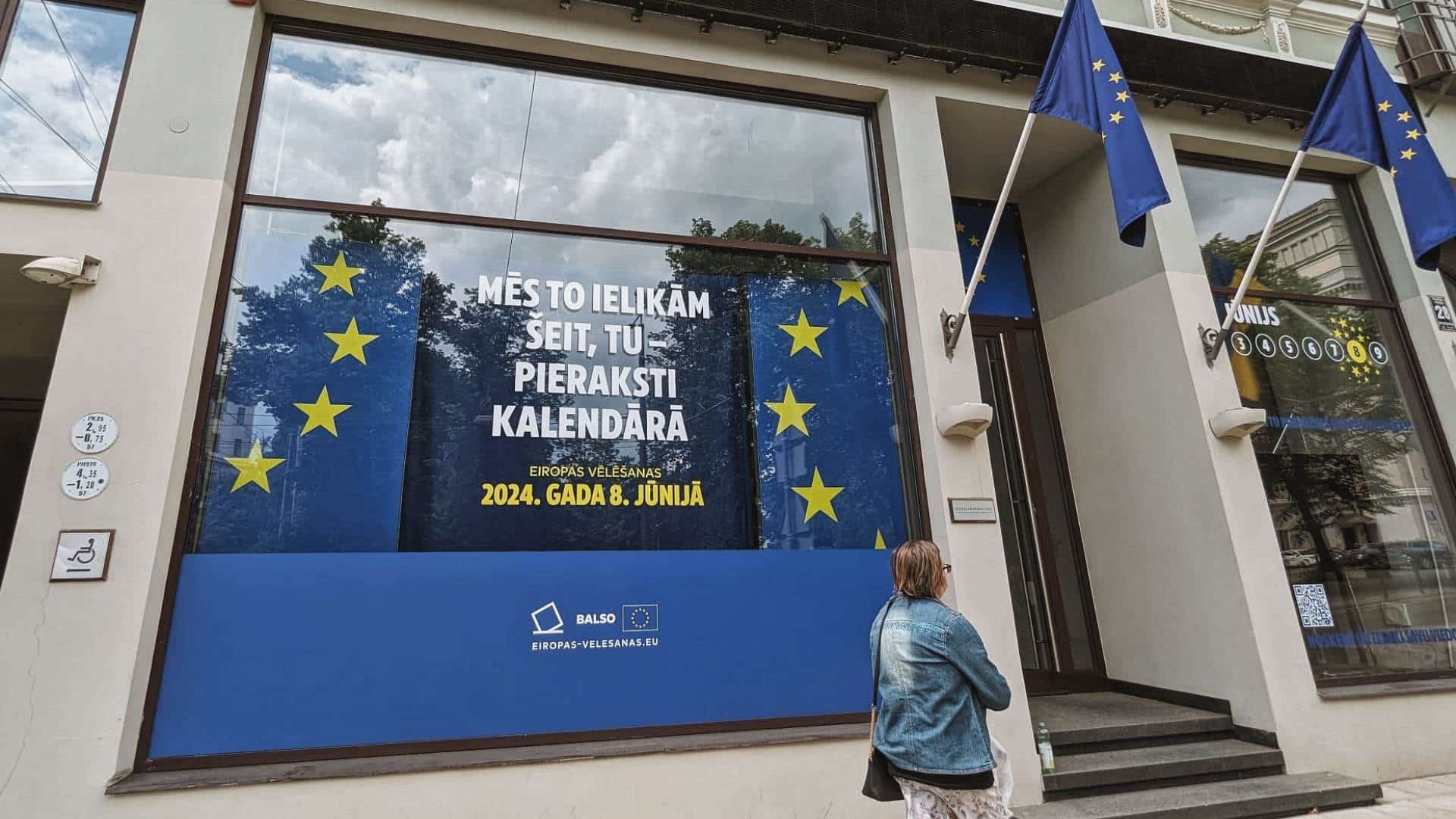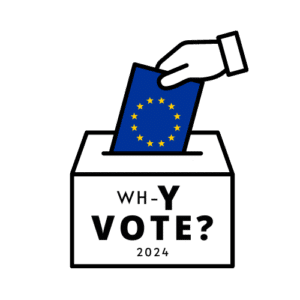Latvian youth are not accustomed to democratic participation. How can they be encouraged?

A woman walks by the European Union House in Riga, Latvia 1 June 2024. In Latvian, the writing on the window says, “We put it here, you write it down in your calendar. European elections June 8, 2024.” Photo by Sabine Bērziņa for News Decoder.
Editor’s Note: This story, by Sabine Bērziņa, user experience manager for News Decoder’s Promoting Media Literacy & Youth Citizen Journalism through Mobile Stories project, is the third article in our five-part Wh-Y Vote series that focuses on youth participation in the upcoming European elections.
Between 6 and 9 June, voters in all 27 countries of the European Union will go to polls to select representatives of the 700+-member European Parliament, the only directly-elected transnational assembly in the world.
The last EU election, in 2019, saw the first increase in voter turnout in 40 years. The leap to just over 50% was largely thanks to a so-called ‘youth surge’: namely a 12% increase in turnout among 25 to 39-year olds and a 14% increase among the under 25s.
Senior EU figures heralded the result as a new era of civic engagement and evidence of strengthened support for the EU. Yet, even with the increase, only half of eligible voters cast a ballot and turnout actually decreased in eight countries.
The 2024 election will include, for the first time, 16-year olds in Germany and Belgium, joining their Maltese and Austrian counterparts who were granted the vote in the 2000s.

Correspondents based in France, Denmark, Hungary, Latvia and Poland have sought the views of young voters and non-voters as well as election experts in their respective countries and, over the course of five articles, will paint a nuanced and candid portrait of the state of the youth vote in the run up to polling day.
At 23, Karlīna Rostoka has never participated in any elections and plans to skip the upcoming vote for the European Parliament as well. Rostoka doesn’t feel negatively towards the European Union or think that elections are pointless.
“I just don’t follow it and didn’t know the elections are happening,” Rostoka said. “It doesn’t seem relevant in my daily life.”
Rostoka is far from alone in this. Voter turnout in the European elections in Latvia has been low and stagnating over the years. In the previous election, only 34% participated. Youth, the group largely responsible for the voter surge in the last European election across the continent, was the least active group in Latvia, according to Eurobarometer data.
Clear answers about the reasons for the low activity of the young voters are hard to pin down. Iveta Kažoka, the director and senior policy analyst of the leading Latvian public policy think tank Providus said that there’s been a lack of research in this area. She points to the fact that the youth tend not to get involved in other forms of civic participation too, not just elections. She wants to study the reasons more after this election, she said.
When researching reasons for the low activity overall, she found that people are satisfied with the European Union but they often don’t feel like their vote can have much impact.
That is also confirmed by Eurobarometer survey data. Although voter activity is lower, citizens’ sentiments toward the European Union are more positive than on average across member states.
Believing in Europe
Latvians are less likely to say that the union conjures up a negative image for them and are less pessimistic for its future than Europeans overall. Trust in EU institutions is also higher than in the national parliament and government. And yet, Latvians think that their voice or the voice of their country counts less than other Europeans.
The small state in the northeast of Europe with a population of 1.9 million people, will elect nine politicians out of the 720 parliamentarians.
Born only four years before Latvia joined the union in 2004, Rostoka cannot compare how the country has changed in the meantime. Despite that, she sees some benefits of the union in her daily life.
She most appreciates unrestricted travel in most of the continent and has noticed investment in infrastructure. She says she used to study and now works as a teacher’s assistant in schools that were renovated with EU funds. Her parents also benefit from the EU’s agricultural subsidies.
Rostoka is not completely disinterested in politics; major global conflicts worry her. She also has paid attention to some news stories about U.S. politics.
“The war in Ukraine opened my eyes,” she said. “I have noticed which parties support Russia and which parties support Ukraine.”
This has made her think that it’s time for her to get more involved in supporting those who support Ukraine. Peace and security is the topic that interests Latvian voters most, a Eurobarometer survey shows. But, for now, Rostoka is unsure about when she will act. Her days get filled up with work, studies and other concerns, she said.
The generation gap in voting
Inga Birzgale, the president of The National Youth Council of Latvia, has drawn similar conclusions as Kažoka. Youth have a lower understanding of the importance of civic participation, than they might if they had experienced the Soviet occupation that ended in 1990.
📣 FOUR REASONS WHY YOUR VOICE ON EUROPEAN ISSUES MATTERS 📣
1. Your freedom of movement
All citizens of EU member countries have the ability to live and work and travel freely anywhere in the EU.
2. Your education
The European Union allows its citizens to study at any EU university under the same conditions as nationals. Under the ERASMUS program, the EU spend 1.2 billion euros for university students to study in other countries. In 2022 alone, some 372,000 students took advantage of this program.
3. Your money
The politicians elected in the European Parliament help shape the EU budget deciding what issues to prioritise. The European Union has allocated 50 billion euros for Ukraine assistance and 118 billion euros for climate change initiatives. For youth in particular, the EU funds employment schemes, regional development programmes and urban regeneration projects.
4. Your rights
In March, the European Parliament passed a law that would ban artificial intelligence applications that violate citizen rights to privacy and their identities, such as the scraping of CCTV footage for facial recognition, and it would require transparency when AI is used. A new policy is pending approval by member states that would force manufacturers to provide easy ways to get products repaired and allow third parties access to spare parts needed to repair broken or damaged products.
The fact that the European Union can feel complex and far removed adds an extra barrier.
“Parents often talk about the [Latvian] parliament and government at home, even if just to complain, but it’s rare to discuss the European Parliament like that,” said Ance Mālkalna, the president of the youth organization Club “The House” that promotes European values.
Both Birzgale and Mālkalna also think that the importance of elections and democracy is not emphasized enough in the school curriculum. According to the National Centre for Education, there are 10 lessons in the education program allocated to discussing civic participation and nine lessons that address globalization and international institutions in the ninth grade.
Later in high school, students learn about democratic governance in 45 lessons, but 30 are dedicated to international relations. Schools can reduce the number of lessons allocated to these topics but not by more than 15%.
Jana Veinberga, the representative of the centre, said that currently there are no plans to increase the number of lessons.
Politics seems irrelevant
Vladislava Romanova is a Latvian documentary maker who recently made a film and a series focusing on the polarization of Latvian and Russian communities. She believes that many Latvian students need to work through some myths before they will participate meaningfully in democracy.
She pointed to Latgale, a region in the East of Latvia that borders Russia. It has the highest share of people speaking Russian at home, as well as the lowest voter turnout. After the positive reception of her documentaries, she was invited to several school and NGO events to speak to young people about these topics.
“We discuss elections because students say that nothing can be changed here, they sit around with sad faces, tell me you can’t accomplish anything, the salaries are low and Riga decides everything,” Romanova said.
She then talks to them about elections as the simplest form to make an impact when they turn 18 and tries to break some misconceptions.
“Many don’t vote because of a lot of distrust that you get raised with in the Russian bubble,” she said. Russian state media propaganda and beliefs transferred from older generations still has significant influence.
Putting youth on the agenda
Romanova saw that many young people in Daugavpils, the largest city in Latgale and Romanova’s hometown, only paid attention to politics and who runs the city when the municipality forbade organizing an event dedicated to the LGBTQ+ community and mental health.
Otherwise, Romanova finds that most are more interested in entertainment and recreation. The questions usually on the political agenda don’t resonate much with them.
This will be the first European Parliament election for Anželika Litvinoviča, 20, who also grew up in Daugavpils.
She is sure she will vote and has always participated in elections before. Litvinoviča thinks that her family and activist friends deserve credit for her involvement. At 15, one of her friends encouraged her to join Protests, a youth organization with progressive politics.
“I was always sure that if I have this opportunity to vote, I should be using it,” she said.
Now, studying communication science and journalism, she said she was shocked to see many other students not raise their hands when asked by a professor if they planned to vote. “Many see politics as complicated and untrustworthy, so they rather choose to attend to their daily issues,” she has observed.

Meaningful engagement
Litvinoviča thinks that lowering the voting age might help, although many oppose the idea. There is a fear that youth don’t understand civic engagement. The matter is frequently discussed before elections without any resolution. But Litvinoviča argues, “politicians would have to pay more attention to things that interest young people if the group of young voters would get broader.”
Kažoka agrees. Even if there’s a potential that young people won’t make the best decisions the first time around and might get easily swayed by populist offerings, they will be more interested in following what it leads to and make better decisions next time.
“In the short-term, it might lower the voter activity,” she said. “There is no reason to think that 16-year-olds and 17-year-olds are more likely to vote than 18-year-olds and 19-year-olds. But in the long-term, Latvian citizens need to learn that they are responsible for what happens in this country.”
Lowering the voting age is also supported by Birzgale and Mālkalna and the youth organizations they represent. Both argue for strengthening civic education in schools in addition to changing the voter age.
Birzgale has also noticed that young people who are active in youth organizations or student councils in their schools are more likely to be engaged in other ways.
Schools can prepare students for civic participation.
School elections provide a practice run for democratic participation. “Those who get involved, also learn to organize events, receive information on opportunities and projects and they can also spread it to their peers,” Birzgale said. She thinks student councils should have ways to make meaningful changes and get support by school staff and other local organizations.
Kažoka praises two projects that have helped involve the next voters in meaningful ways.
Last year, the Latvian chapter of Transparency International Delna made an educational resource for schools that advocated for allocating a special “participation budget” for student activism in schools. In the project students must research ideas, pitch their projects and budget and organize voting to choose what to implement.
The city of Cēsis in Latvia had a play-election for children in parallel to the parliament election in 2022. Pre-schoolers could vote to choose whether they wanted purple or yellow flowers in a playground and second to seventh grade students could pick new equipment for the same playground. Students from eighth to twelfth grade chose a location for new water refilling stations in the city. Overall, more than 1,300 voters participated.
The representative of the Cēsis municipality, Aleksandrs Abramovs, said that due to the costs of the project it won’t be repeated this time around.
Perhaps early experience with voting would give young people in Latvia a better appreciation of the importance of elections. Birzgale, of The National Youth Council said Latvian youth seem to lack that understanding.
“For the youth, living in a democracy now feels like a given,” Birzgale said. “They don’t understand why they should get involved if we have it.”

Sabīne Bērziņa is News Decoder’s user experience manager for its Promoting Media Literacy & Youth Citizen Journalism through Mobile Stories project. She is a media literacy curriculum and tool developer, as well as a journalist with nine years of experience in the media industry. She lives and works in Latvia.
Three questions to consider:
- What is one big issue worrying Latvian voters?
- Why do older Latvian citizens have a different appreciation for European membership than younger voters do?
- In what ways might voters in Western Europe have a different perspective on the European elections than voters in Eastern Europe?
Wh-Y Vote 2024 is funded by the European Union. Views and opinions expressed are however those of the author only and do not necessarily reflect those of the European Union or the Directorate General for Communications Networks, Content and Technology. Neither the European Union nor the granting authority can be held responsible for them.

